Victor Freed
A medical student who died of typhoid fever in France while tending to the American wounded after World War I.
The Freed Family
Victor Freed was born on April 16th 1896 in Denver, Colorado, the second of eight children born to Hungarian immigrants, Max Freed and Rose Freed (née Grossman). Victor’s family traveled extensively, presumably due to his father’s business as an art dealer, with their first son Arthur having been born only a year and a half earlier in Charleston, South Carolina.
Following the birth of two more sons, Hugo (b. 1897 in Boston) and Sydney (b. 1900 in New Jersey), Victor’s father would eventually start a merchandising business in early 1902, incorporating the American & Colonial Supply House in New York with his wife and another business partner. But later that year, the family would head west, moving to Spokane, Washington and setting up stores for the business both there and in downtown Vancouver, British Columbia.
In early 1903, a fire broke out in the Spokane store. his father’s company would soon change names to The Max Freed Furniture Company. A few months later, following the arrival of another brother Walter (b. 1903), the Freed family would move from Spokane to Vancouver. Two years later, the family welcomed a new daughter Ruth (b. 1905), Victor’s only sister.
Another brother Ralph (b. 1907) was born soon after. And five years after opening for business in downtown Vancouver, The Max Freed Furniture Company was by all appearances flourishing.
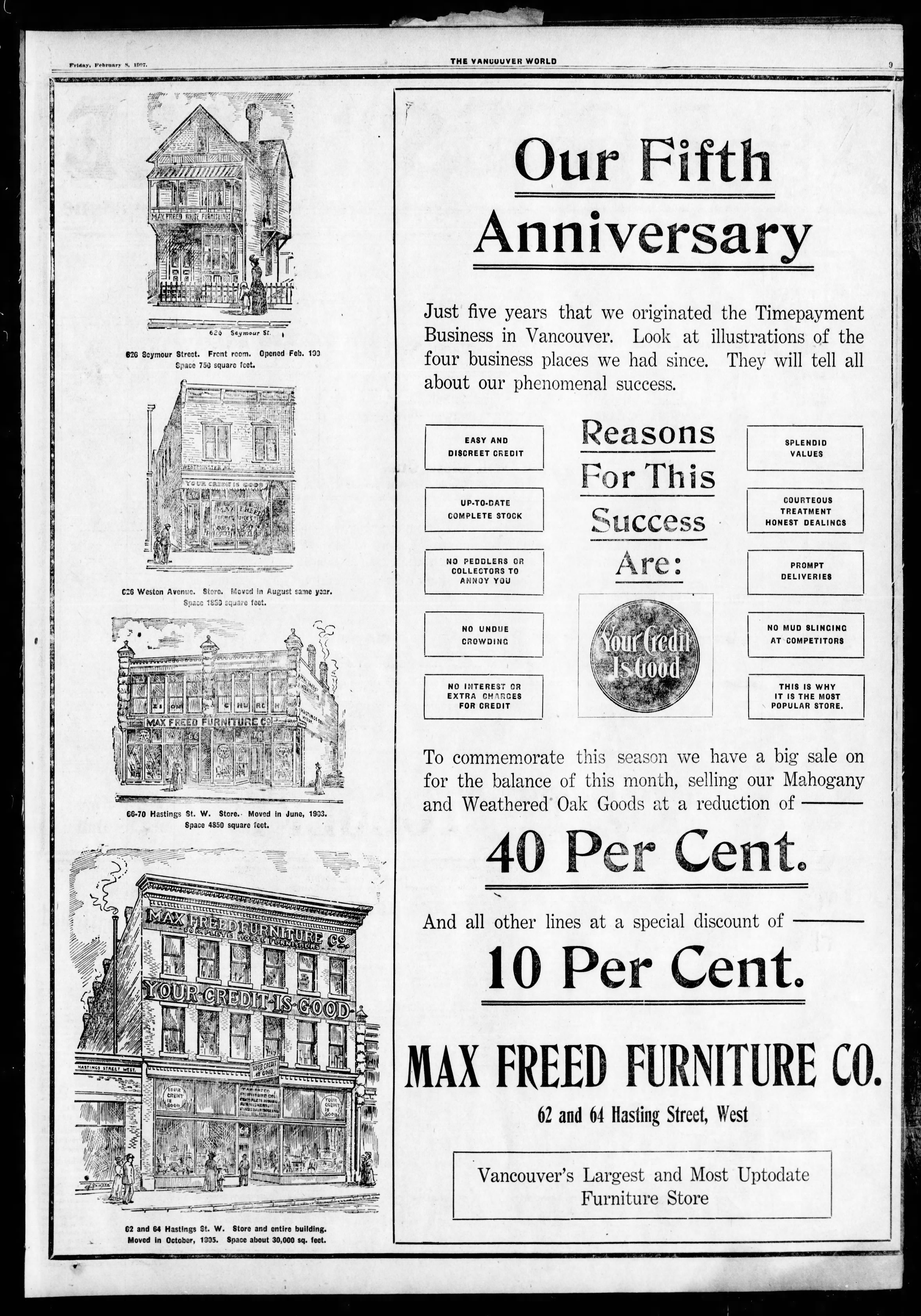 Vancouver Daily World, February 8th 1907
Vancouver Daily World, February 8th 1907
In 1908, the Freed family would return to Washington, with his youngest Canadian-born children, Ruth and Ralph, immigrating to the United States. The following year, they returned to Vancouver from a trip to Liverpool, England, sailing on board the Empress of Britain in August 1909. By 1910, they would be living in Seattle Ward 3 of King County, Washington, according to that year’s census. By all accounts, Max Freed was still very successful. The family lived with two servants in an art-decorated home overlooking the cherry orchards near Lake Washington.
By 1912, Max Freed’s furniture company would be out of business. Unable to secure a renewed lease for the furniture store, Max Freed announced that he was going out of business. But soon after, a fire destroyed the store, causing $70,000 in damages. The remaining furniture stock was sold at a discount only a few weeks later.
Victor’s father would continue doing business in downtown Seattle, while also maintaining a dairy farm in nearby Bellevue, Washington which he eventually sold in 1914. But by the summer of that same year, World War I would officially begin in Europe.
By July 1916, Max Freed would be president of the newly incorporated Standard Tire & Rubber Factory Company, a new business capitalized at $500,000 that was hoping to start operations in nearby Olympia. This new business effort could have been in response to the recently passed National Defense Act of 1916, a buildup of the US military and its supplies in anticipation of joining the war.
Less than a year later in April 1917, only 10 days before Victor’s 21st birthday, the US officially entered World War I and declared war on Germany.
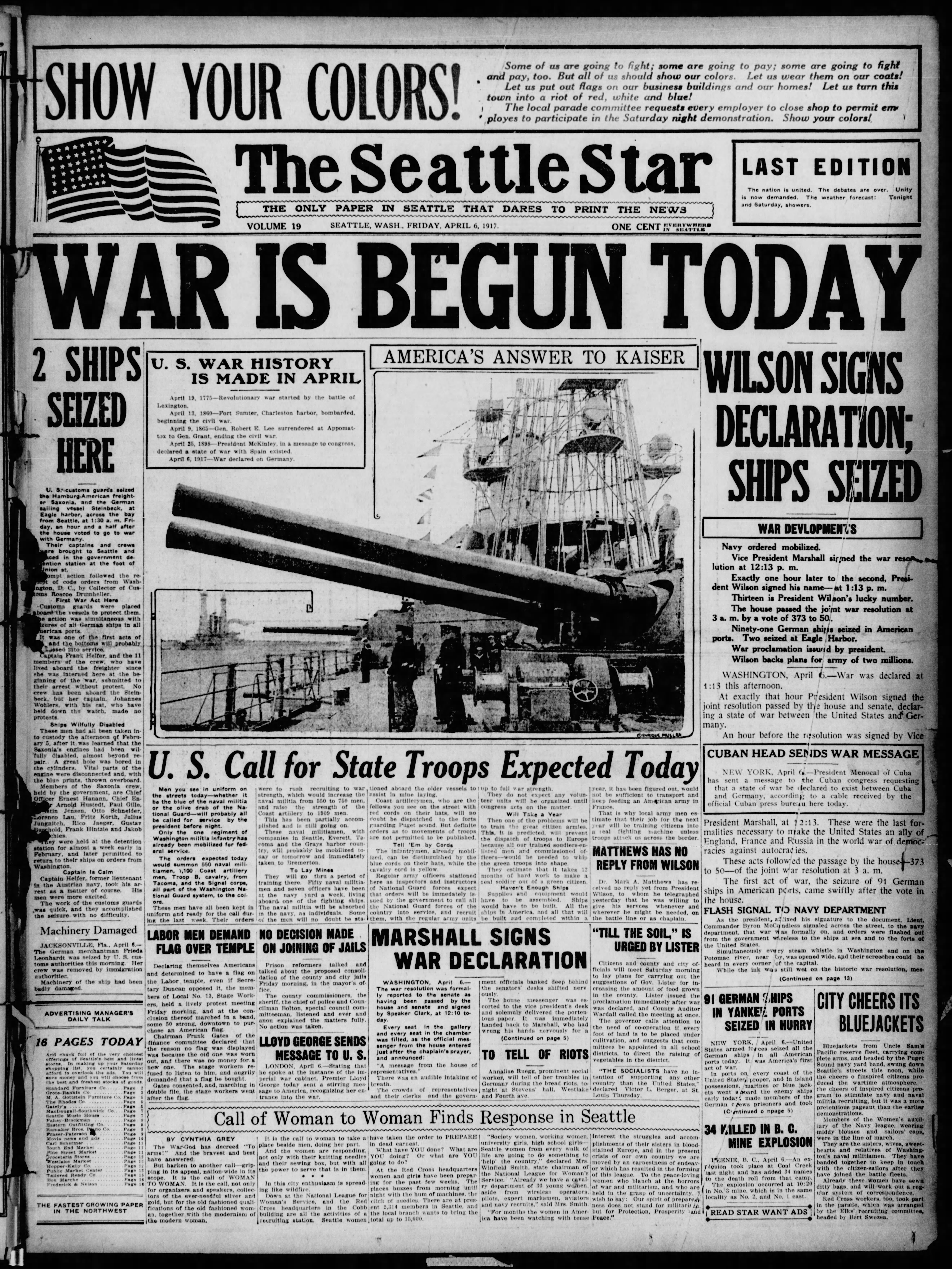 The Seattle Star, April 6th 1917
The Seattle Star, April 6th 1917
A Family Tragedy
Sadly, less than a month later, tragedy would strike the Freed family. On May 9th, Victor’s father Max committed suicide at his office in downtown Seattle.
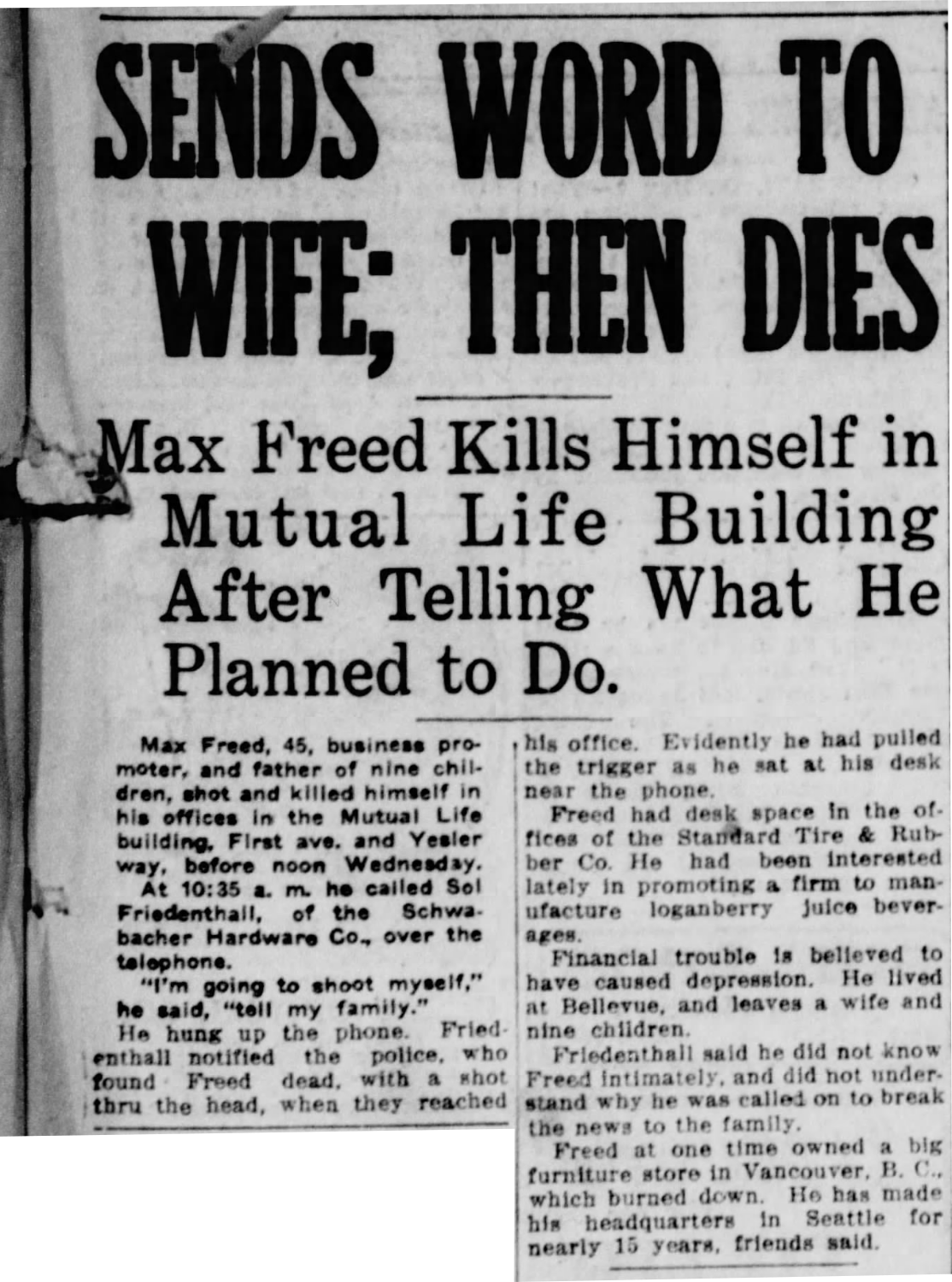 The Seattle Star, May 9th 1917
The Seattle Star, May 9th 1917
Apparently suffering from depression related to ongoing financial issues, Max had phoned an acquaintance and then subsequently shot himself in the head. He left behind his wife Rose and their eight children, including their oldest son Arthur (age 23) and their youngest son Clarence (age 6).
Going to War
Only a week later, the United States would pass the Selective Service Act of 1917, the start of the military draft during World War I. Victor was likely down in Eugene, Oregon, pursuing his studies as a medical student at the University of Oregon. Only three weeks after his father’s death, Victor would submit his draft registration card on May 28th, 1917 in Bellevue, Washington at the age of 21.
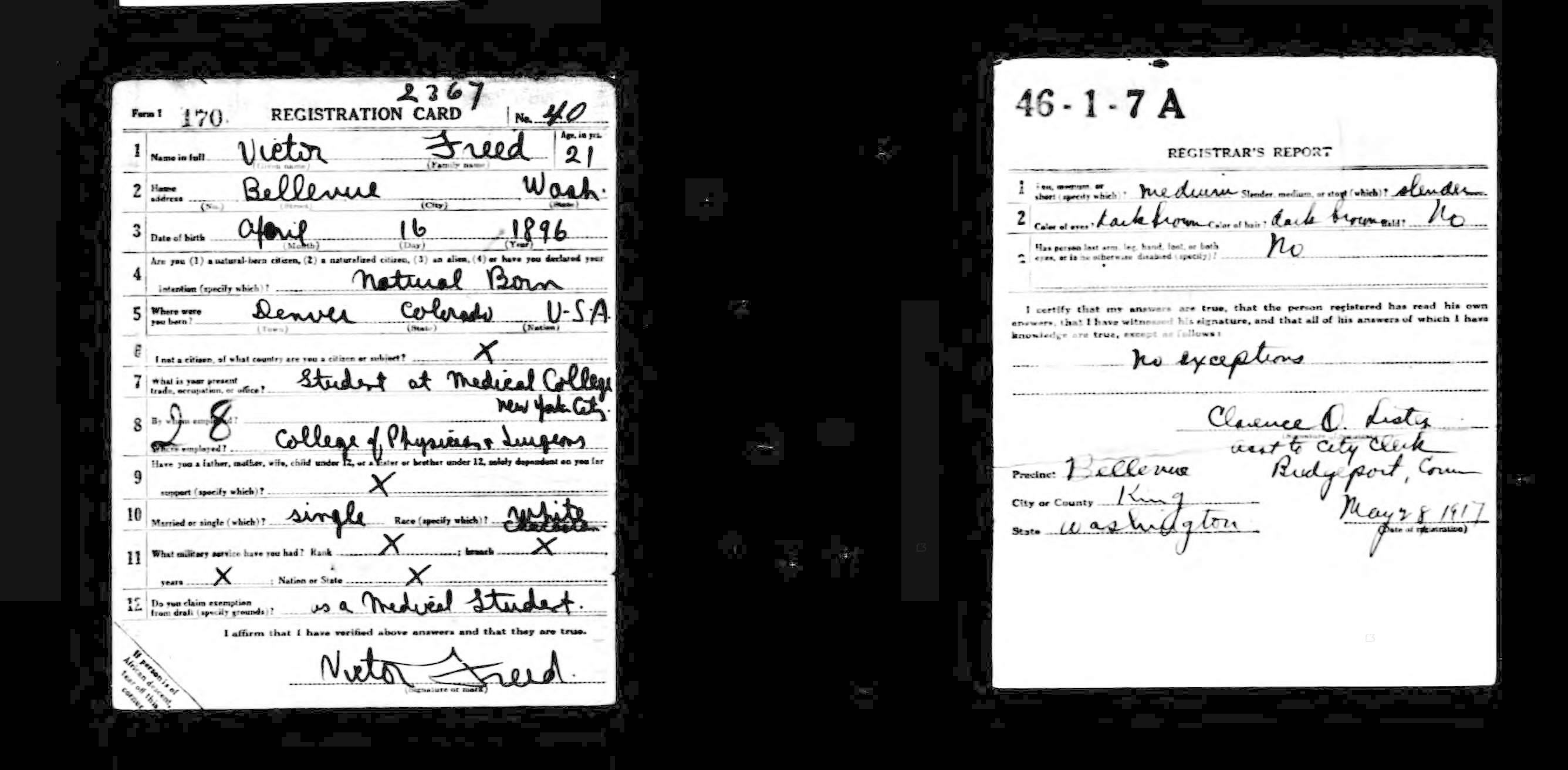
A year after his father’s death, the fighting in Europe had begun to reach a crescendo and the United States was poised to enter the war in force as the Germans began their spring offensive.
At some point between 1917 and 1918, Victor would eventually join the US Army, putting his medical studies on hold. As a newly enlisted private in the US Army Medical Corps (ASN 887434), he likely would have undergone specialized military training for a new experimental type of mobile medical unit, and he would eventually be assigned to the Mobile Hospital Unit No. 102.
Brothers in Arms
Three of Victor’s brothers (Arthur, Hugo and Sydney) would also join the military during this time. Arthur would be drafted in the fall of 1918 and was assigned to the 13th Sanitary Train, part of the Field Hospital Number 251, 13th Division, stationed at Camp Lewis just outside of Seattle in Tacoma, Washington. Already well on his way to a successful career in the entertainment industry, Arthur would quickly establish himself as a talented writer and performer of fighting songs at the military camp.
Like his brothers, Hugo was also assigned to the US Army Medical Corps, assigned to 116th Sanitary Train, part of the 163rd Field Hospital attached to the 41st Infantry Division. He would sail from New York to Europe in December 1917.
But unlike his brother Hugo, Arthur and his “Lucky 13th” Division would never deploy to France. With the armistice signed on November 11th 1918, the Great War in Europe was officially over.
Sailing for France
Even with the war over, Victor’s military service was just beginning. He would set sail for Europe, two days after the armistice was signed. Alongside 12 officers and 77 other enlisted men in the Mobile Hospital Unit No. 102, Victor would set out on the Empress of Britain, sailing from the port of New York to the shores of England on November 13th 1918.
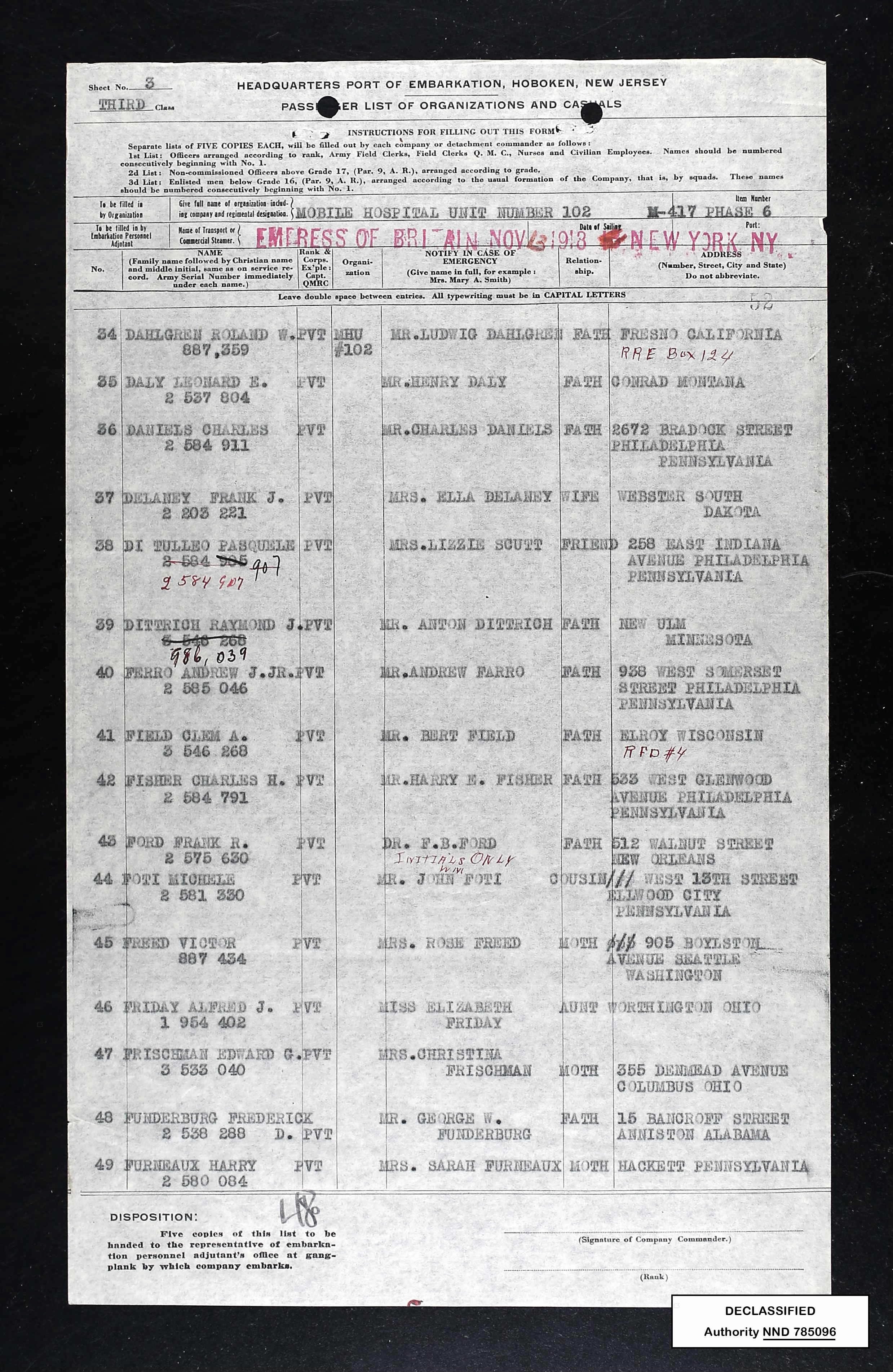
It may have been surprising for Victor to board the same ship that he had sailed on just nine years earlier, at the age of 16, on his family’s journey from England to Canada. Only now he was heading in the opposite direction and heading off to war.
After a few weeks sailing across the Atlantic, the Mobile Hospital Unit No. 102 would arrive in England. They would then shortly depart from Southampton for Le Havre, France on November 27th.
Victor would eventually go on to Curel, France, a 500 kilometer march past the city of Paris from the port of Le Havre, where he presumably began providing medical care to the wounded American soldiers recovering after the war.
Death by Disease
After only two months since he had left the shores of America, Victor would lay dying at a hospital in rural France. An outbreak of typhoid fever had occurred across the medical departments operating in the area, including the Mobile Hospital No. 102. The outbreak, caused by untreated water supplies, resulted in 72 cases of the fever among the 1,800 wounded soldiers and medical workers.
After suffering the ravages of diarrhea for over 30 days in Curel, Victor was likely brought to a nearby hospital across the Marne river in the small town of Chatonrupt. On his deathbed and with the help of a Red Cross nurse, Victor would dictate a letter to his mother back home in Seattle.
 The Seattle Star, February 24th 1919
The Seattle Star, February 24th 1919
“I hate to tell you this, mother, for I know how much you love me”, Victor wrote. Accepting his fate with a hunch that he would not recover from his illness, he wrote “you always said everything was fate–fate took away darling father just the same.”
“It is just awful, mother, and I do not know how to conclude this letter and say goodbye. I know it is awful to lose a son, but if it has to be done, it must be done. So, in conclusion, beloved mother, if anythings happens to me, try to forget me. Your loving boy, Victor.”
On January 15th 1919, two days after dictating the letter to his mother, Victor was dead after succumbing to typhoid fever at the age of 22. He would be one of 21 deaths due to the typhoid fever outbreak at Curel.
Less than two months after his death, the surviving 7 officers and 60 enlisted men of Mobile Hospital Unit No. 102 would set sail from France on the USS Seattle, a ship eponymously named after Victor’s hometown. Soon thereafter, Victor’s younger brother Hugo would return home as well, presumably recovering from wounds as he sailed home with the St Aignan Casual Company (No. 4964) from Saint-Nazaire, France to Newport News, Virginia.
Returning Home
In January 1920, back home in Washington a year after Victor’s death, the Bellevue Minute Women planted three elm trees to honor the supreme sacrifice made by Victor and two other local boys.
The following year, his body would be sent home from Europe, sailing from Antwerp, Belgium to New Jersey on the funeral transport ship USAT Wheaton in April 1921.
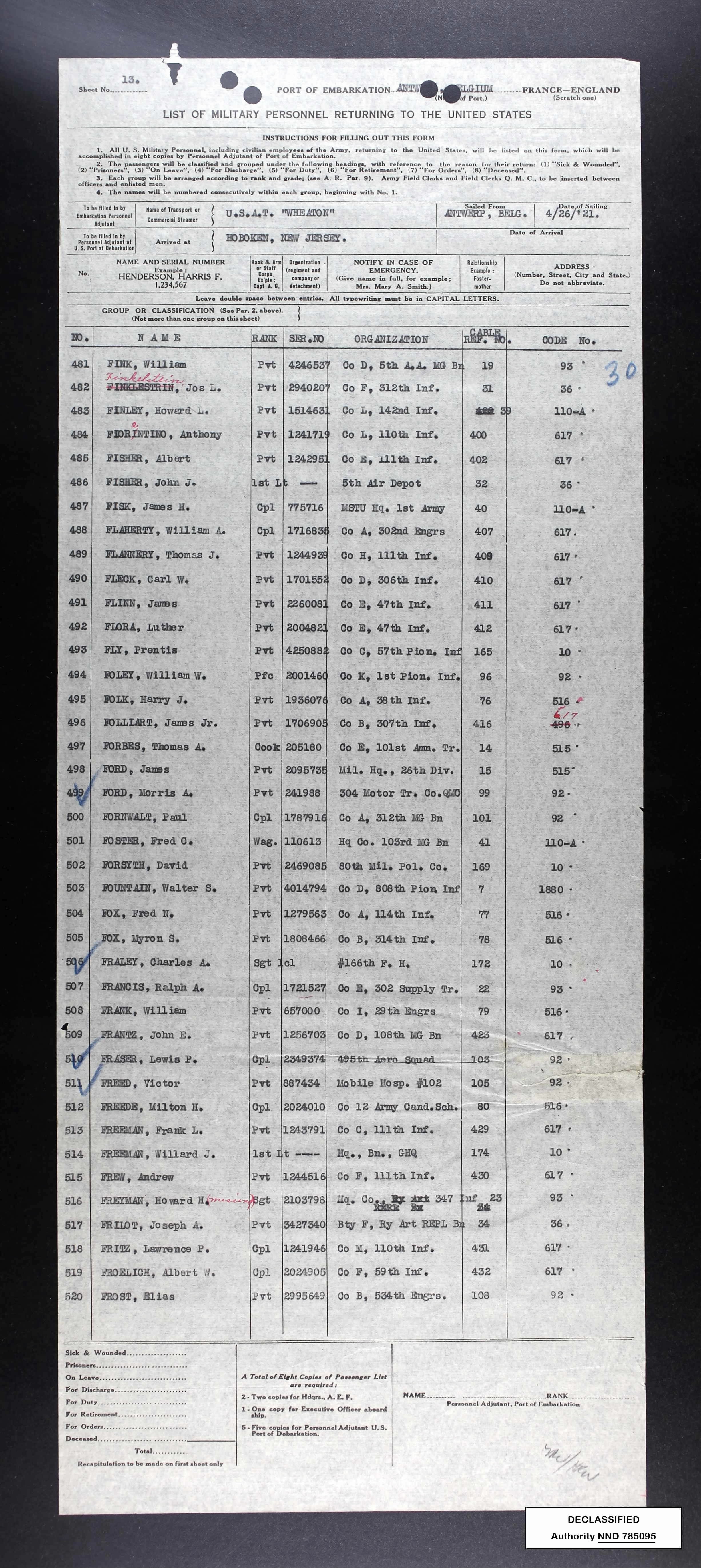
Over 6000 dead American soldiers would accompany Victor home, one of the largest funeral shipments that would return from the deadly war.
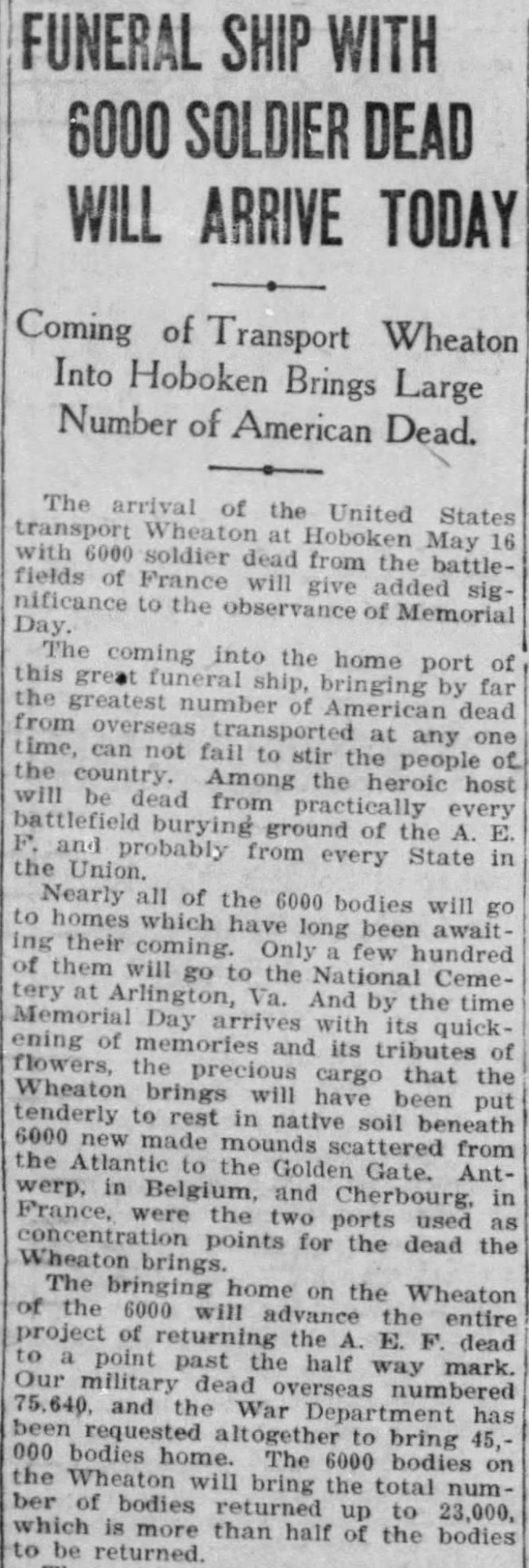 Austin American-Statesman, May 16th 1921
Austin American-Statesman, May 16th 1921
About a month after arriving in New Jersey in early May, his body was transported back to Seattle, arriving home in June 1921.
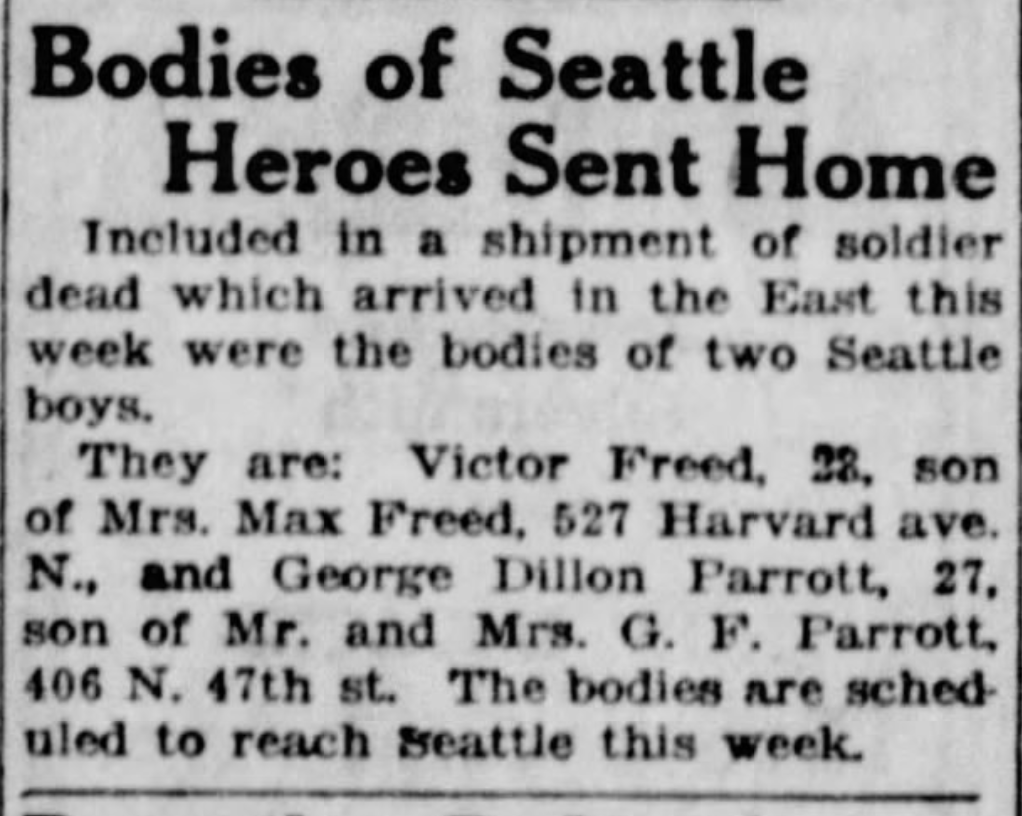 The Seattle Star, June 15th 1921
The Seattle Star, June 15th 1921
On his return, Victor Freed was buried at the Hills of Eternity Cemetery in northern Seattle, presumably near his father’s grave in the same cemetery.
A Fresh Start
The following year, leaving the ghosts of her husband and son behind in Seattle, Victor’s mother and her youngest children Ruth, Ralph and Clarence moved to Los Angeles, presumably joining her older children who were already becoming more established in the Hollywood industry.
 The Seattle Star, September 7th 1922
The Seattle Star, September 7th 1922
A Family at Rest
In 1957, some forty years after the death of her husband and son, Victor’s mother Rose passed away at the age of 86 in Los Angeles, California.
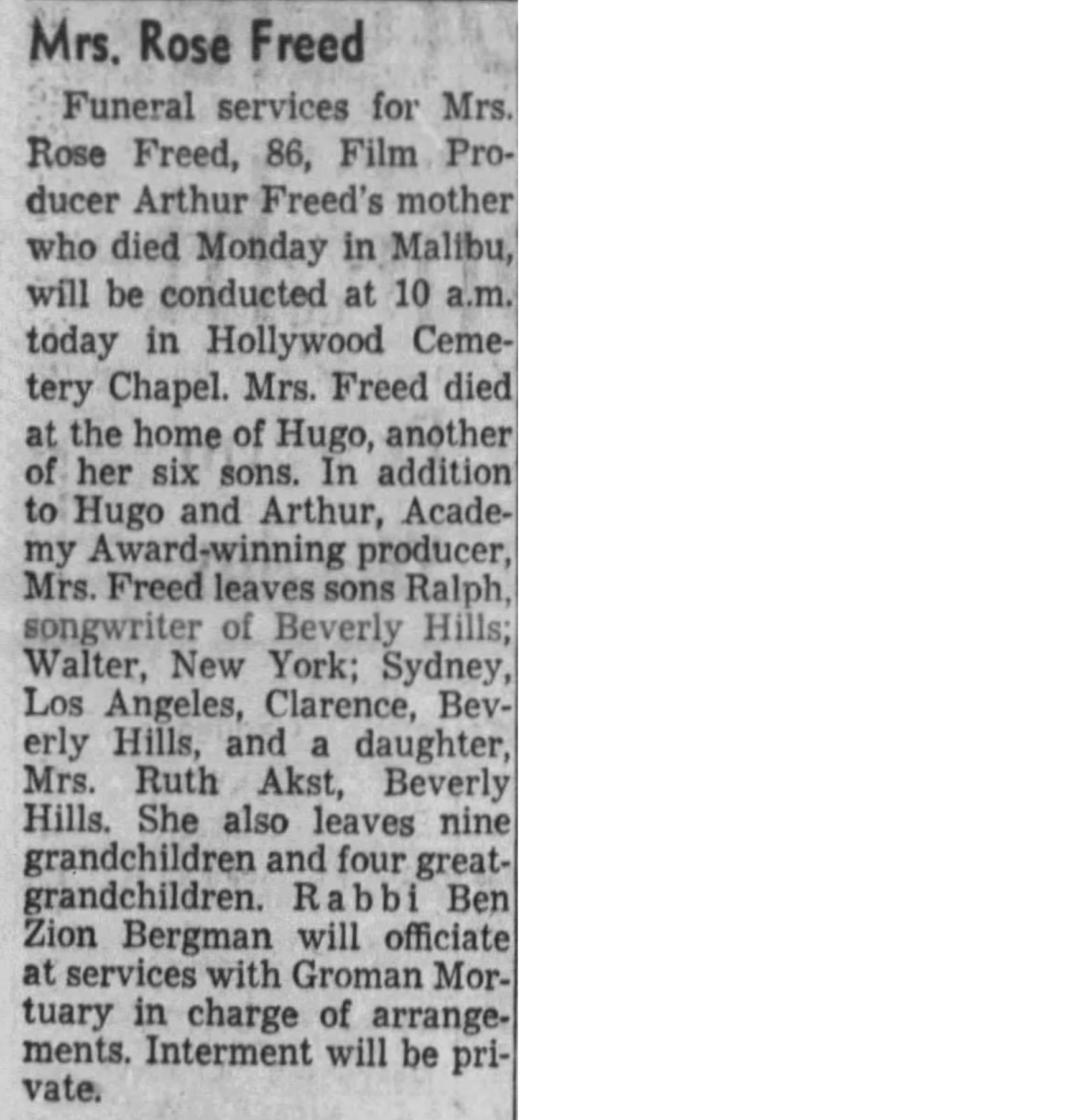 The Los Angeles Times, March 15th 1957
The Los Angeles Times, March 15th 1957
Presumably, later that same year after his mother’s death, Victor’s brother Arthur would bring his departed family back together again. He apparently paid to have his brother and father disinterred from the Hills of Eternity Cemetery in Seattle and then brought down to the Los Angeles area. They were reinterred at the Hillside Memorial Park Cemetery in Culver City, where Rose was also interred.
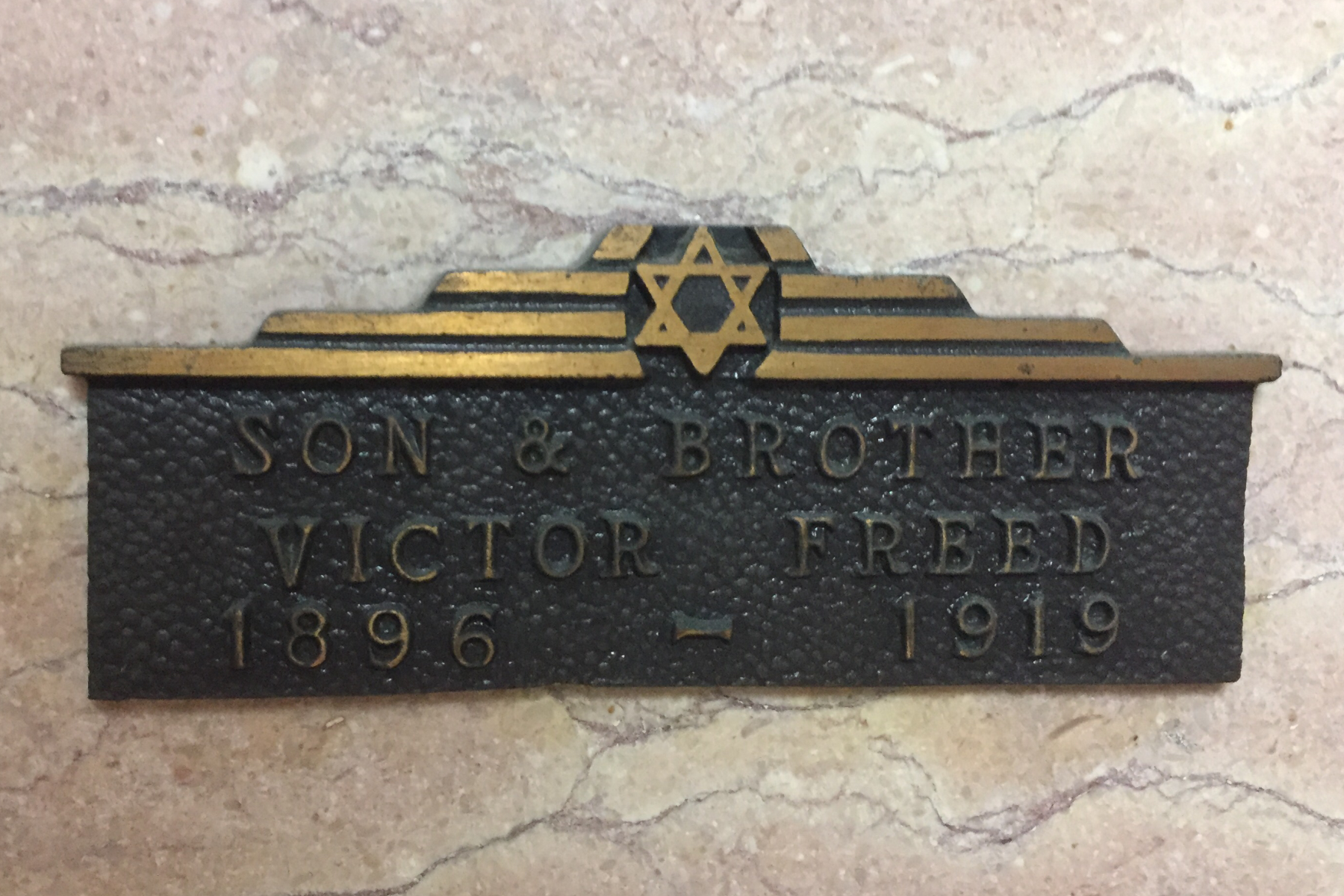 Find A Grave
Find A Grave
Decades later, Victor’s brothers Hugo and Ralph opted to be cremated after their deaths. It’s unclear where his brothers Ralph and Walter were buried. The rest of the Freed family is buried in together eternal slumber at the Hillside Memorial Park Cemetery, including Max and Rose with their children Arthur, Sydney, Ruth and their beloved son Victor who gave his life in service to his country.
In Memoriam
The memory of Victor Freed and his supreme sacrifice lives on to this day, immortalized as an elm tree and in the monument “Lest We Forget” at Downtown Park in Bellevue, Washington.

- Posted on:
- December 27, 2019
- Length:
- 9 minute read, 1882 words
- See Also: